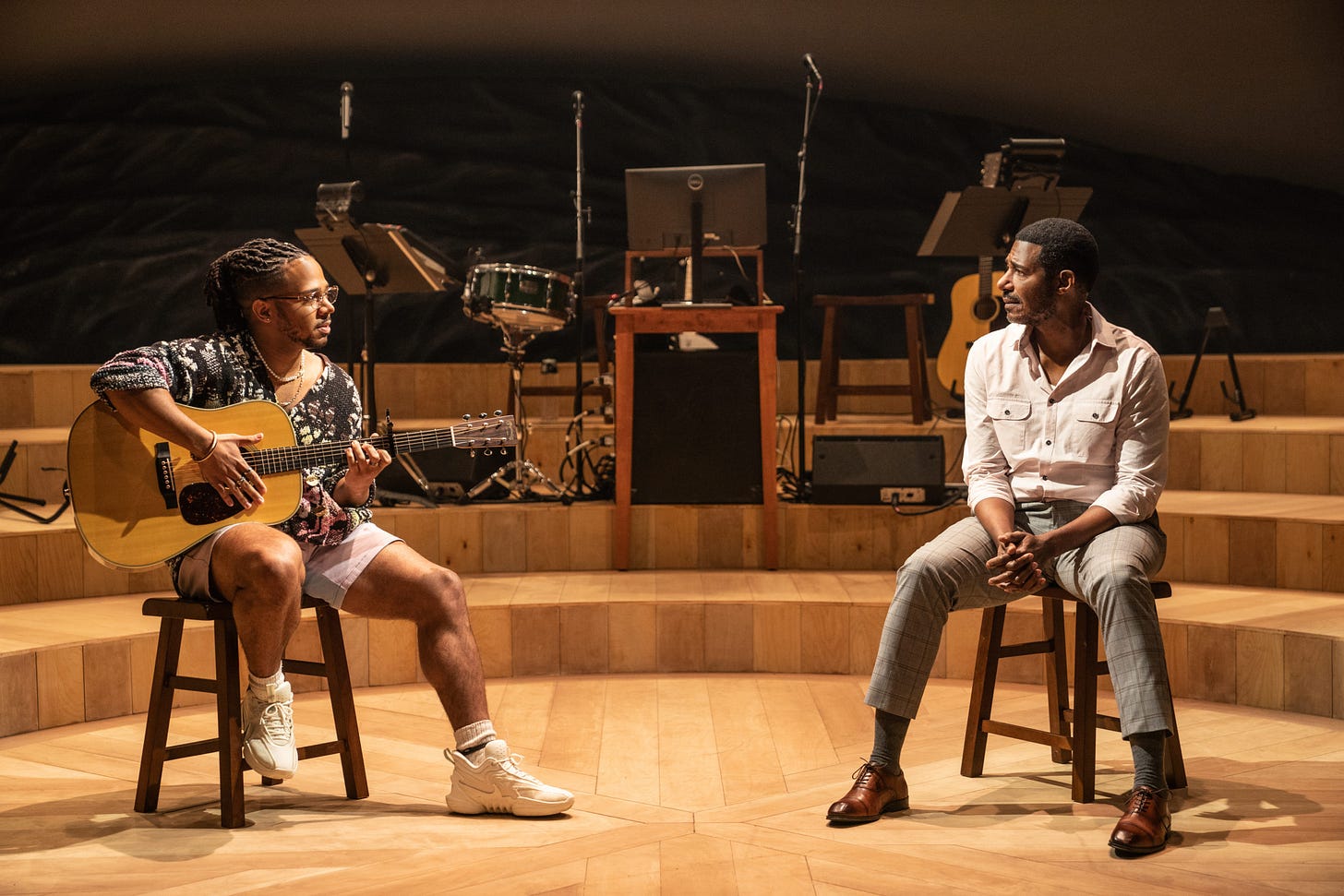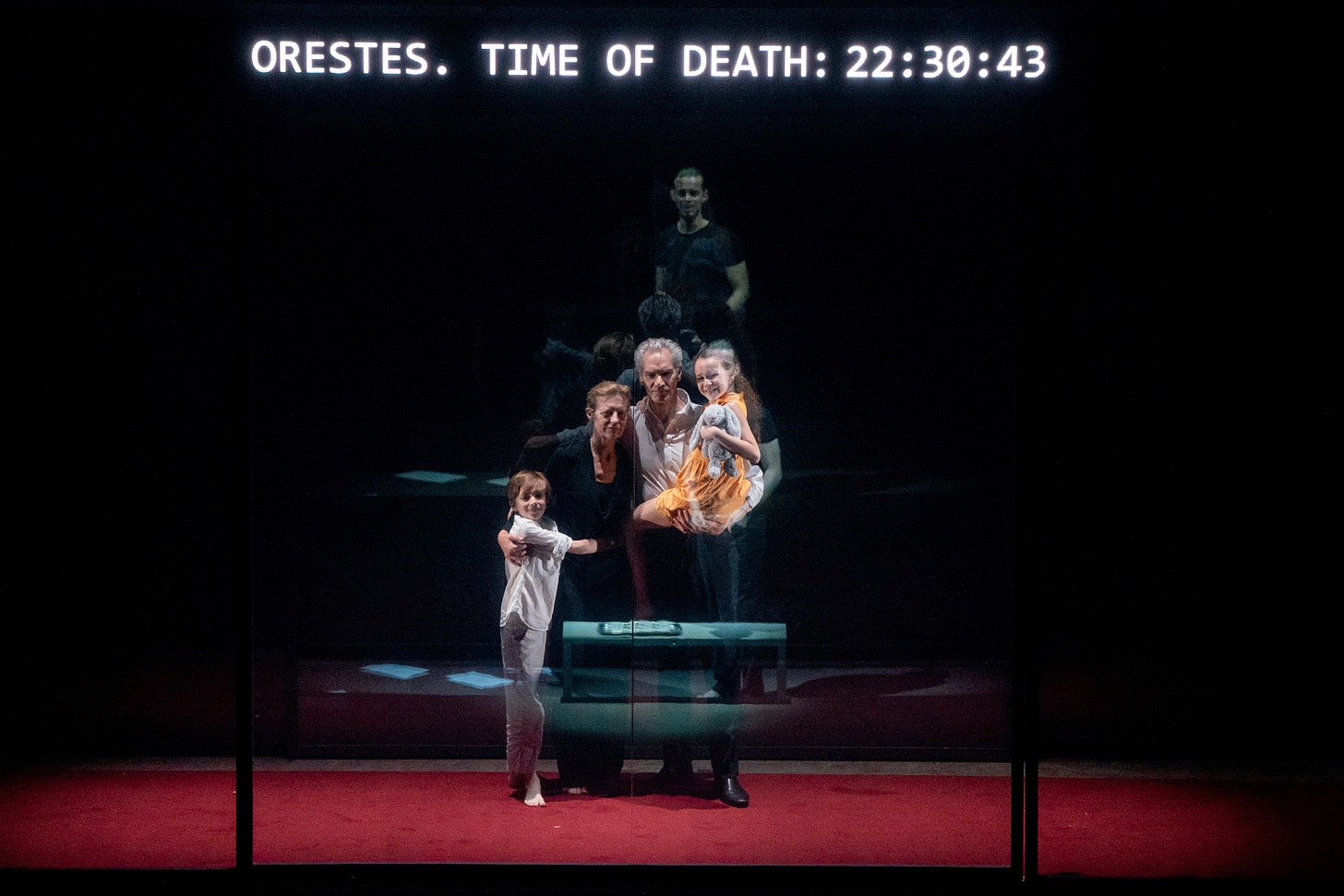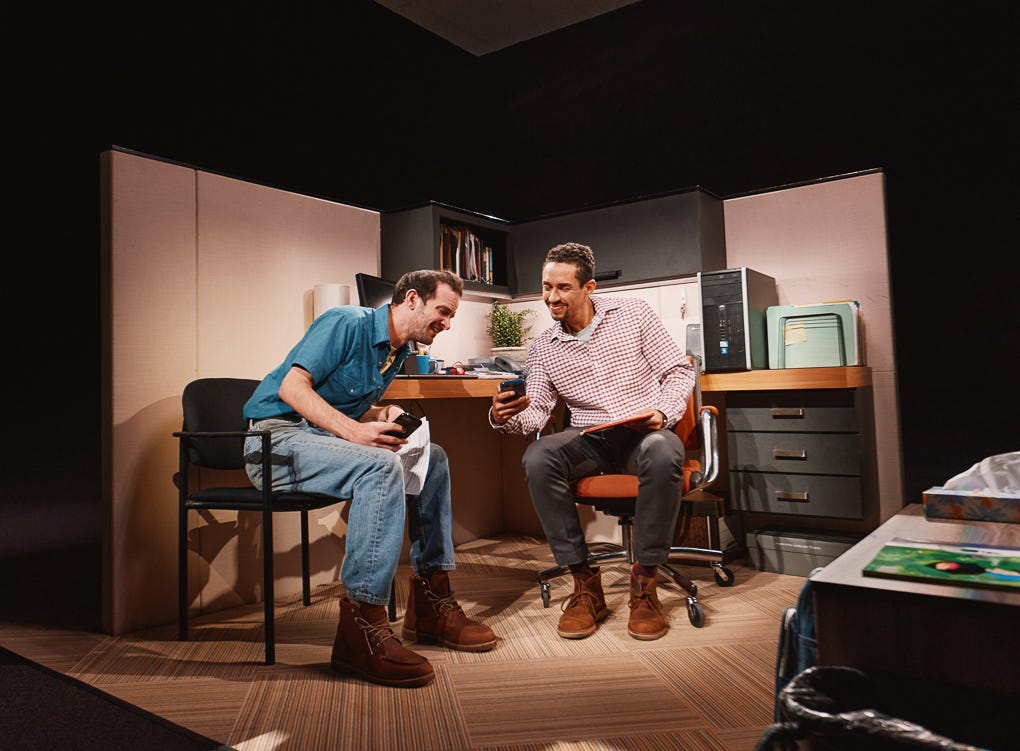10) My Onliness (One-Eighth Theater, New Ohio & IRT Theater)
Madcap brilliance, or barrage of nonsense? Let’s say both. Robert Lyons’ new play My Onliness was downtown with a capital D, an abstract work about a dictator ruling over the New Ohio Theatre with childlike glee and demented cruelty. The Mad King’s subjects included a petitioner seeking to curb his barbarism, whom he sets out to impress. As the king, Daniel Irizarry (who also directs) frequently brings the action to a crashing halt as he rants about nonsense, bullies audience members into moving props, or flings himself around the stage like a rag doll.
While not the deepest political show you’ll see ever, My Onliness came closest to capturing how a world under Trump viscerally felt than any work I’ve seen: an endless barrage of noise and stupidity, mostly meaningless, with barely a moment to breathe. It was also some of the most fun I had all year—theater as trip to a whole other plane of reality.
9) Downstate (Playwrights Horizons)
Bruce Norris’ recent work has not been heralded for its nuance. His sex party play The Qualms was an on-the-nose satire of middle-class mores, while The Low Road, though a lot smarter and way more entertaining, was hardly subtle in its dissection of the cruelties of capitalism. The premise of Norris’ new work, Downstate, suggested a disaster in the making: at a halfway house for convicted sex offenders re-entering society, one of the men’s past victims arrives to confront his abuser.
What a relief to instead find Downstate a careful, sensitive and deeply humane work, probably the finest Norris has ever written. This extraordinary play found complex, tortured humanity in all its characters, even the most irredeemable. Pam MacKinnon guided the tone expertly, presenting these often horrendous individuals with a matter-of-fact truthfulness.
If Norris does suggest the victim’s pursuit of catharsis is ultimately misguided, he does so not judgmentally but with a brutal kind of empathy: Such catharsis is impossible, and victim and abuser are trapped together in a cruel, endless cycle.
8) & Juliet (Stephen Sondheim Theatre)
Fun is hard! I walked into the wacky jukebox musical & Juliet in a horrible mood—tired, anxious and totally out of it. Now I won’t say this delightful, joyously stupid show literally cured my depression. But by the time Betsy Wolfe belting “That’s the Way It Is,” had segued, oh-so naturally, into a jubilant rendition of Backstreet Boys’ “Everybody,” sending myself and my audience dementedly screaming for more, memory of that bad mood had long since left my brain. Theater that helps you forget all your troubles? It’s not easily done. What a thrill.
7) You Will Get Sick (Roundabout Theatre Company)
Noah Diaz’s strange work about a dying millennial who hires an older woman to deliver his bad news somehow, possibly through a paperwork error, got itself programmed at Roundabout’s larger Laura Pels space: this despite the play’s frequent references to New Yorkers being snatched up by giant birds; or the young man’s failing limbs gradually turning to hay; or a long, oddly moving sequence in a terrible acting class, where the man and his paid helper find a surprising synchronicity.
For all its delightful oddness, You Will Get Sick ultimately arrived at straightforward, deeply moving conclusion. Its final sequence (which featured the finest set transition of the season) was a stunning depiction of the moment of death, all the more gutting for its startling simplicity.
6) Where the Mountain Meets the Sea (Manhattan Theatre Club)
Jeff Augustin’s tale of grief and missed connections, a play with songs performed live by The Bengsons, was not without its issues. It followed two parallel tales: a father immigrating to the U.S. from Haiti and decades later, his son making a similar journey following the father’s death. The disjointed structure could, at times, feel distancing. And The Bengsons folk-rock style was a strange choice to accompany this particular story.
All that said—. I lost my father at 16. Grief is a long and messy journey. Augustin’s play concludes with father and son, who have not interacted on stage before this moment, sitting down together and joining in song. Suddenly I found myself weeping. So yes—flaws, dramaturgical blah blah, whatever. For me, this play was a release, unexpected and deeply gratifying. What’s theater for, if not that?
5) Oresteia (Park Avenue Armory)
Robert Icke’s reimagined Oresteia was exhausting in all the best ways, a near four-hour theatrical epic spread across generations of grief, vengeance and violence. The evening featured too many astonishing moments and stage images to even count, let alone catalog. But for me, that “God Only Knows” needle drop into Agamemnon’s brutal murder sticks out as a favorite stage moment of the year. Hooting, and also hollering.
4) English (Atlantic Theater Company & Roundabout Theatre Company)
In a classroom in Karaj, Iran, four adult students learn English together as they prepare for a critical exam. Sanaz Toossi’s careful, piercing play included some of the most quietly heartbreaking scenes of the theatrical year, and featured an especially devastating performance from Pooya Mohseni.
Toossi’s play unpacked complex questions of assimilation and cross-cultural identity, but proved most affecting as a contained tale of lonely individuals, all seeking connection, and all continually failing to understand one another.
3) A Case For the Existence of God (Signature Theatre)
A confidence verging on arrogance characterized David Cromer’s transcendent staging of Samuel D. Hunter’s latest masterwork. Signature had put the play in the Diamond, its largest space. So Cromer confined its two actors to a tiny office cubicle upstage center and left the rest of the space bare, an overwhelming void bearing on two little people struggling to get by.
Hunter’s typically open-hearted work concerns a mortgage broker trying to help his client, a recent divorcee with poor credit, purchase a plot of land. The two connect and become each other’s support system, helping each other through various cruelties as that cubicle seemed to shrink ever smaller. Then, a transcendent final sequence breaks free of that little box, jumping forward in time in a stunning coup de théâtre. No-one writes about loneliness quite like Hunter. Yet somehow, his work always makes you feel less alone.
2) Wedding Band (Theatre For a New Audience)
Awoye Timpo’s masterful production of Alice Childress’ lost masterpiece was the most atmospherically transporting staging of the year. Timpo reshaped the Theatre For a New Audience space to incredible effect, evoking the Deep South of 1918 with simplicity and care. The feat was not one of scale or strict historical accuracy, but rather the conjuring up of a feeling—feelings of community, but also deep underlying tension; and of a home built with love, but resting shakily upon unsteady foundations.
Childress’ play is a searing look at prejudice, and the impossibility of love amid conditions of unfiltered hate. It confronted ugly, suffocating racism with greater honesty than any recent new work, despite Childress having written it in 1972. Still, Timpo also allowed, in a stunning final flourish, beauty and joy to find their way into the evening. A historic and essential production.
1) The Skin Of Our Teeth (Lincoln Center Theater)
What else could it be? Lileana Blain-Cruz’s huge, ambitious production of Thornton Wilder’s messy masterpiece was a titanic achievement and the greatest joy of my theatergoing year.
The Skin of Our Teeth is about the end of the world, and the astonishing scale of this production’s sets, puppets and seamless projections conjured apocalypse to gleefully terrifying effect. The stupendous Gabby Beans delivered one of the greatest performances I’ve ever witnessed. Wilder’s manic work proves more timely than ever.
A perfect production of such an insane text would be impossible, and Teeth certainly had its missteps, including a poorly paced third act. But what is perfect anyway? And while it might sound odd to say about an 80-year old work, this Teeth felt like an imagining of a way forward for theater: imaginative, adventurous, tied to history but also pushing into the future. Bring on the apocalypse.














love the love for both Gabby and "The Skin of Our Teeth" ... I was biased as a Thornton Wilder devotee, but I feel this play never gets the credit it deserves and I was dispirited by the empty seats when I saw it the week after opening, and thus feared that it would fade in memory either poorly or (worse) without much note
an exquisite production